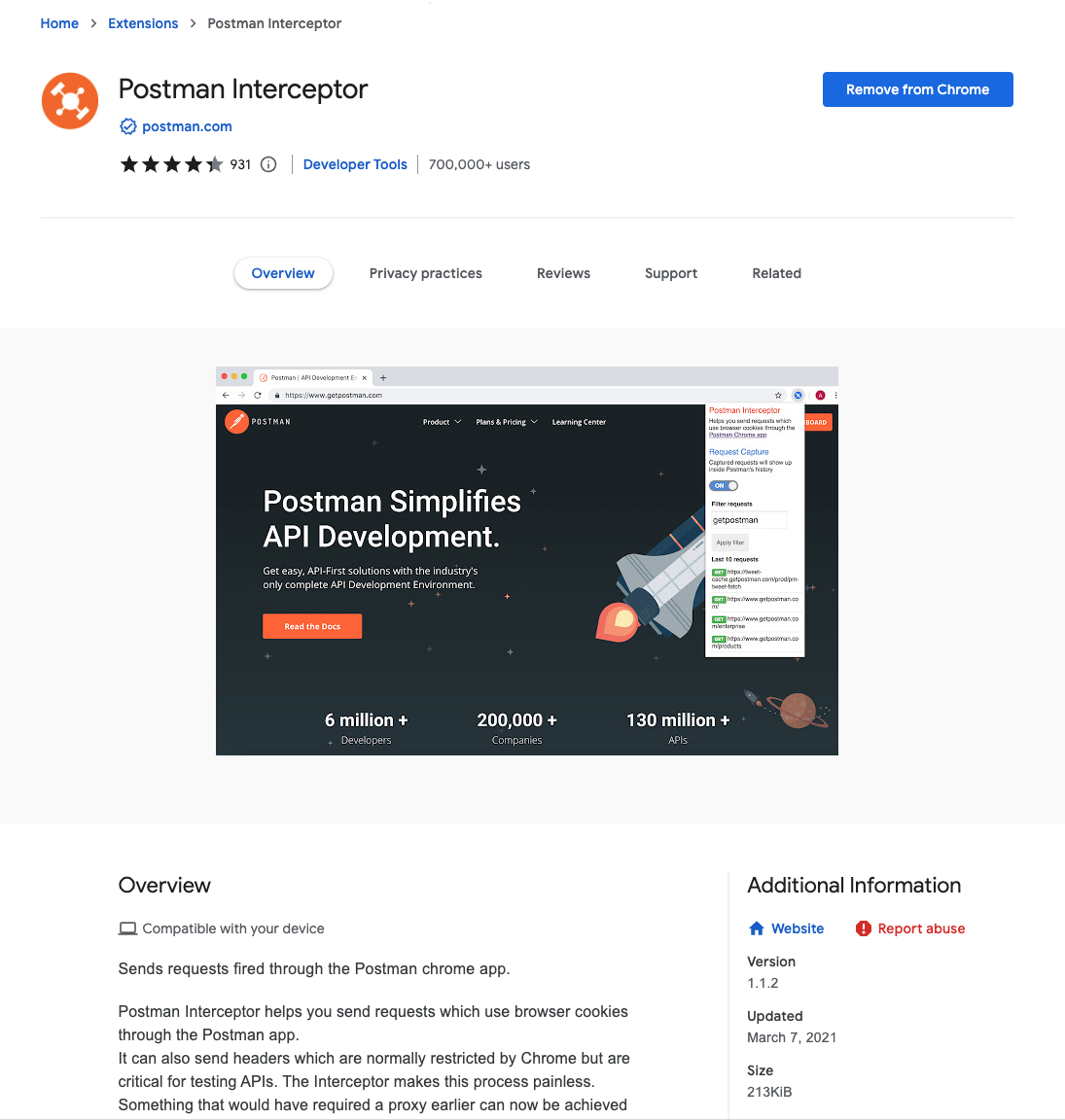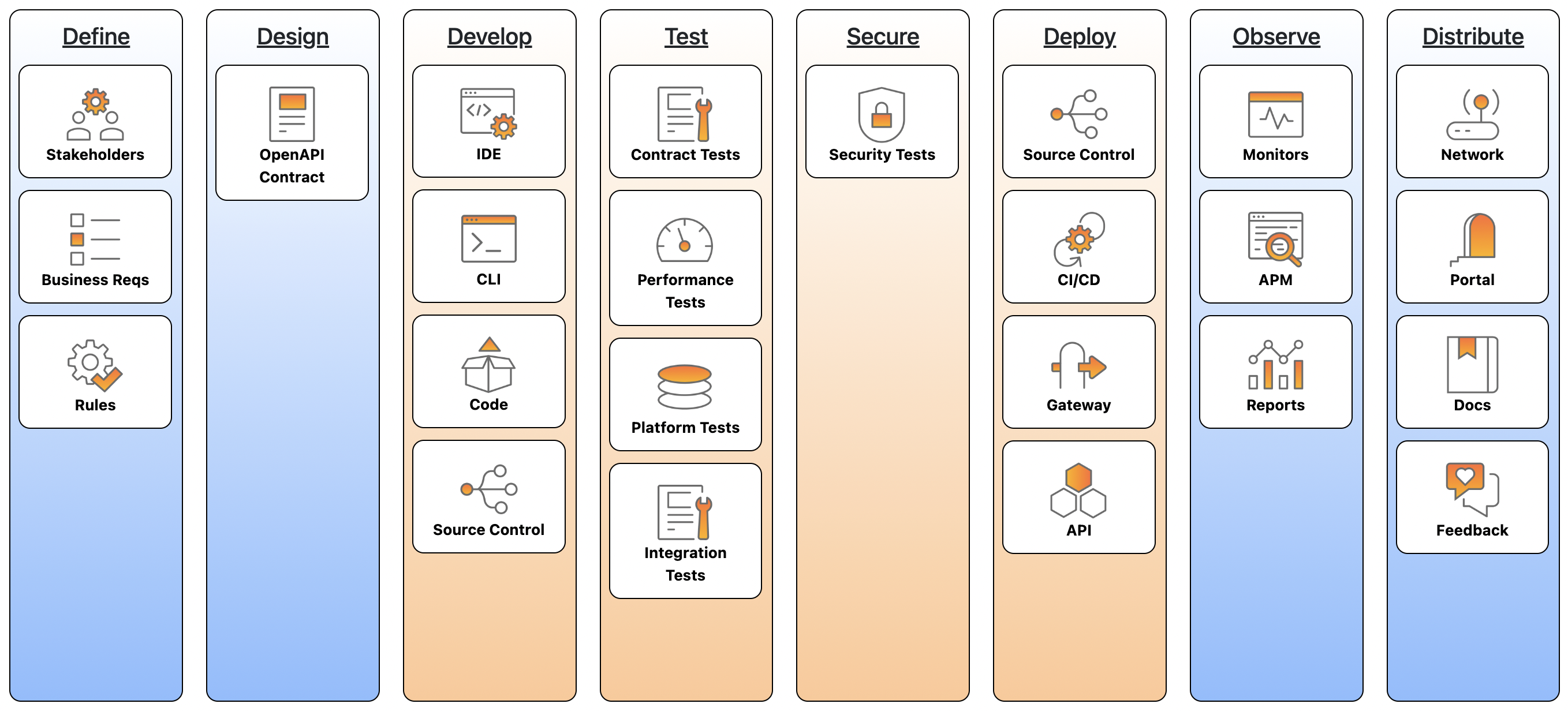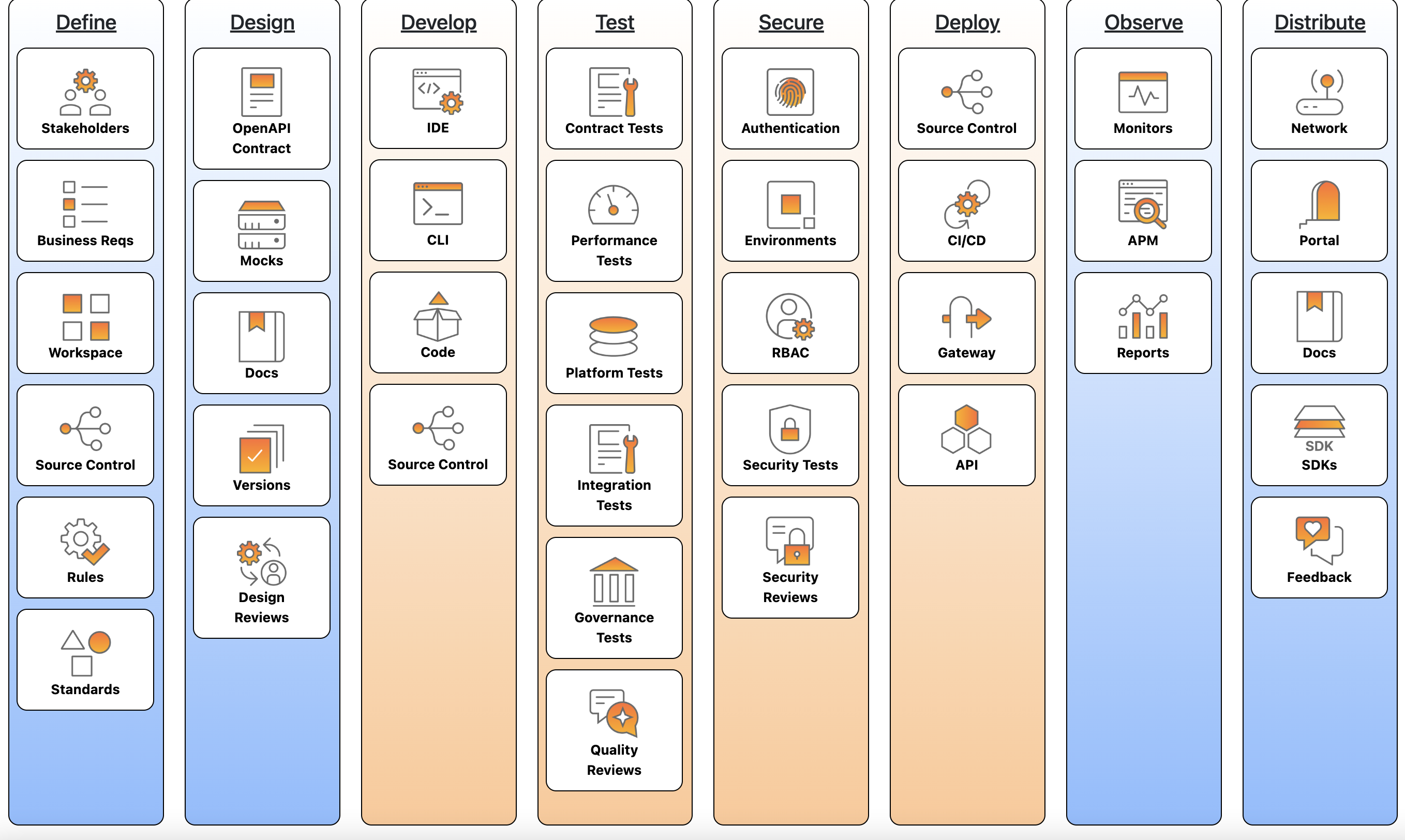Blog

 Everything in this world seems to occur in cycles, with many patterns I’ve wrestled with years ago coming around again. In 2014, in the heart of the Oracle vs. Google, me and my partner in crime Steve Willmott created the API Commons and APIs.json to help us make sense of the sprawling API landscape we saw emerging. I’ll dive into what each of these projects were shortly, but in short, they are machine-readable open so...
Everything in this world seems to occur in cycles, with many patterns I’ve wrestled with years ago coming around again. In 2014, in the heart of the Oracle vs. Google, me and my partner in crime Steve Willmott created the API Commons and APIs.json to help us make sense of the sprawling API landscape we saw emerging. I’ll dive into what each of these projects were shortly, but in short, they are machine-readable open so...

 Good API trends can linger on for some time, but as with the decline of monolith, many love to anticipate the death of microservices through strangulation by its own distributed weight. While event-driven, circuit-breakers, GraphQL, and other leading patterns will continue to help us orchestrate successfully across this chaos, there are some other elements of our API operations that will be shaping what the API landscape looks like in the coming years.
Good API trends can linger on for some time, but as with the decline of monolith, many love to anticipate the death of microservices through strangulation by its own distributed weight. While event-driven, circuit-breakers, GraphQL, and other leading patterns will continue to help us orchestrate successfully across this chaos, there are some other elements of our API operations that will be shaping what the API landscape looks like in the coming years.

 As I work to rebuild my social presence via Mastodon, I am reminded of how I built API Evangelist using Twitter and my blogs between 2010 and 2020. I am very invested in API platforms these days, and API blah blah blah that will attract the attention of enterprise organizations. So I tend to tell stories about things like API collaboration, automation, and governance, and things that API producers care about. As I do the work each week to slowly build my Mastodon community for my API Evang...
As I work to rebuild my social presence via Mastodon, I am reminded of how I built API Evangelist using Twitter and my blogs between 2010 and 2020. I am very invested in API platforms these days, and API blah blah blah that will attract the attention of enterprise organizations. So I tend to tell stories about things like API collaboration, automation, and governance, and things that API producers care about. As I do the work each week to slowly build my Mastodon community for my API Evang...

 This is a short story about metadata (I have to assume at this point you can read). About why a data file or dataset on its own is inadequate for analysis or research, and therefore insufficient to draw conclusive evidence or make informed decisions. Why you should never publish data or make it available through an API without its documentation. And, being mindful that computer applications are the immediate data consumers, emphasize the importance of machine actionable metadata. Here is a...
This is a short story about metadata (I have to assume at this point you can read). About why a data file or dataset on its own is inadequate for analysis or research, and therefore insufficient to draw conclusive evidence or make informed decisions. Why you should never publish data or make it available through an API without its documentation. And, being mindful that computer applications are the immediate data consumers, emphasize the importance of machine actionable metadata. Here is a...

 I was recently reading this article about “Why Python is not the programming language of the future”. I’m not sure whether this will happen, but the author makes some very interesting points. One that I’m particularly sensitive about is performance. I grew up as a C/C++ developer (and other languages like Pascal, Assembly, COBOL, Prolog, LISP, or even APL). These we...
I was recently reading this article about “Why Python is not the programming language of the future”. I’m not sure whether this will happen, but the author makes some very interesting points. One that I’m particularly sensitive about is performance. I grew up as a C/C++ developer (and other languages like Pascal, Assembly, COBOL, Prolog, LISP, or even APL). These we...

 I am down in the quantum realm when it comes to API operations. Working at the atomic level when it comes to how we do APIs. One of my favorite ways to make fun of APIs is to use the How to Draw an Owl analogy for how we teach people to do APIs. TL;DR we leave out a lot of details when we talk about and teach people about APIs. To help me address this problem in my storytelling I am exploring how we can use common approaches to API governance to enable teams across the enterprise to do the...
I am down in the quantum realm when it comes to API operations. Working at the atomic level when it comes to how we do APIs. One of my favorite ways to make fun of APIs is to use the How to Draw an Owl analogy for how we teach people to do APIs. TL;DR we leave out a lot of details when we talk about and teach people about APIs. To help me address this problem in my storytelling I am exploring how we can use common approaches to API governance to enable teams across the enterprise to do the...
 I am fascinated with cultivating the hashtags that come through my Mastodon instances. I have two domains setup. Kin Lane and API Evangelist. My personal one is more photos, libraries, travel, outdoors, where my professional one is APIs, data, platforms, and protocols. Once you start following, following, posting, and engaging with other instances, your hashtag trends begin to evol...
I am fascinated with cultivating the hashtags that come through my Mastodon instances. I have two domains setup. Kin Lane and API Evangelist. My personal one is more photos, libraries, travel, outdoors, where my professional one is APIs, data, platforms, and protocols. Once you start following, following, posting, and engaging with other instances, your hashtag trends begin to evol...
 I was talking to someone yesterday about the growing need to reverse engineer what is happening across this sprawling API landscape. While there is a lot of focus on having an API strategy, standardizing the API lifecycle, and investing in API governance, the greatest benefit Postman providers for developers is the ability to reverse engineer and make sense of the API chaos around us. You can turn on
I was talking to someone yesterday about the growing need to reverse engineer what is happening across this sprawling API landscape. While there is a lot of focus on having an API strategy, standardizing the API lifecycle, and investing in API governance, the greatest benefit Postman providers for developers is the ability to reverse engineer and make sense of the API chaos around us. You can turn on

 Data intelligence and Metadata Inference
I recently spent some time exploring one of my favorite data intelligence related topics: metadata inference. How do we take an undocumented dataset, like a CSV file, and automatically generate documentation and knowledge around it with no or minimal human intervention. The end goal being to uplift data and complement with machine actionable metadata and transform it into digital knowl...
Data intelligence and Metadata Inference
I recently spent some time exploring one of my favorite data intelligence related topics: metadata inference. How do we take an undocumented dataset, like a CSV file, and automatically generate documentation and knowledge around it with no or minimal human intervention. The end goal being to uplift data and complement with machine actionable metadata and transform it into digital knowl...
 If you tune into my storytelling, you’ll hear me say this a lot—-APIs are hard to see. Any API, but more importantly, legacy APIs are just really hard to see. As a result, it is very difficult to quantify the technical debt that is accumulating across the enterprise. None of the enterprises I talk to know where all of their APIs are, and the older the API is, the higher the chance the API doesn’t have up-to–date documentation, artifacts, and other things that help us see the surface area o...
If you tune into my storytelling, you’ll hear me say this a lot—-APIs are hard to see. Any API, but more importantly, legacy APIs are just really hard to see. As a result, it is very difficult to quantify the technical debt that is accumulating across the enterprise. None of the enterprises I talk to know where all of their APIs are, and the older the API is, the higher the chance the API doesn’t have up-to–date documentation, artifacts, and other things that help us see the surface area o...
 I am always looking for ways to help teams fight the good fight when it comes to cultural change across API operations. The technology of APIs takes a lot of work, but it never requires as much work as the business and people side of API operations. Gathering stories from across the conversation I am having, sharing them here on the blog, and via the Postman blog is how I look to scale my advice and guidance for shifting enterprise behavior. Today I wanted to aggregate a handful of stories...
I am always looking for ways to help teams fight the good fight when it comes to cultural change across API operations. The technology of APIs takes a lot of work, but it never requires as much work as the business and people side of API operations. Gathering stories from across the conversation I am having, sharing them here on the blog, and via the Postman blog is how I look to scale my advice and guidance for shifting enterprise behavior. Today I wanted to aggregate a handful of stories...
 I am immersed in the federated Mastodon universe the last month, and I’ve been immersed in the federated universes of FHIR, PSD2/PSD3, and UK Open Banking for a number of years. It is unlikely that anyone involved in the Mastodon universe right now would consider what is happening could be related to the fina...
I am immersed in the federated Mastodon universe the last month, and I’ve been immersed in the federated universes of FHIR, PSD2/PSD3, and UK Open Banking for a number of years. It is unlikely that anyone involved in the Mastodon universe right now would consider what is happening could be related to the fina...
 I’ve mentioned lately on social media that there was a federated convergence occurring right now. Not just across the Mastodon explosion that has happened recently, but also enterprise customers I am talking with in my work at Postman, and regulation I see emerging from governments. While at different levels, and possessing very different motivations behind these movements, they share a lot of common patterns I think we need to pay attention to.
I’ve mentioned lately on social media that there was a federated convergence occurring right now. Not just across the Mastodon explosion that has happened recently, but also enterprise customers I am talking with in my work at Postman, and regulation I see emerging from governments. While at different levels, and possessing very different motivations behind these movements, they share a lot of common patterns I think we need to pay attention to.
 I was just on a call where I heard one of the more succinct definitions of the difference between Postman and the waves of “Full Lifecycle API Management” solutions that have come before us. API Management providers possessed a core set of API gateway capabilities that they would bundle documentation, portal, analytics, and other platform capabilities you will need-—forcing you to buy it all as a bundle. With Postman, and an API platform, you get to choose and pick all the platform capabil...
I was just on a call where I heard one of the more succinct definitions of the difference between Postman and the waves of “Full Lifecycle API Management” solutions that have come before us. API Management providers possessed a core set of API gateway capabilities that they would bundle documentation, portal, analytics, and other platform capabilities you will need-—forcing you to buy it all as a bundle. With Postman, and an API platform, you get to choose and pick all the platform capabil...
 I have been immersed in the Mastodon universe since Thanksgiving. I have been growing my network for both my personal and professional domains, and have been playing with the Mastodon API daily. I have been slowly automating much of my curation, posting, filtering, and other information activities I historically conduct via Twitter, but now I am automating using the Mastodon API. To help me automate using the Mastodon API,
I have been immersed in the Mastodon universe since Thanksgiving. I have been growing my network for both my personal and professional domains, and have been playing with the Mastodon API daily. I have been slowly automating much of my curation, posting, filtering, and other information activities I historically conduct via Twitter, but now I am automating using the Mastodon API. To help me automate using the Mastodon API,
 I frustratingly see APIs everywhere in a world where most do not even know what an API is while also simultaneously using them thousands of times each day. I see and hear the gears of this new digital world turning each day, and can’t help but share stories about what is happening around us while leveraging the stories of others to help me make sense of this moment. I was recently reading About Time - A History of Civilization in Twelve Cl...
I frustratingly see APIs everywhere in a world where most do not even know what an API is while also simultaneously using them thousands of times each day. I see and hear the gears of this new digital world turning each day, and can’t help but share stories about what is happening around us while leveraging the stories of others to help me make sense of this moment. I was recently reading About Time - A History of Civilization in Twelve Cl...
 I’ve had many, many, many people over the years accuse me of being a shill for technology because my brand centers around API Evangelist. It is common for people to look at what I do at face value, and assume I am evangelizing that everyone should be doing APIs. This couldn’t be farther from the truth, but most people will never stick around long enough to learn and understand any more than that. Those that stick around and get to know me realize I am actually very against APIs in most cas...
I’ve had many, many, many people over the years accuse me of being a shill for technology because my brand centers around API Evangelist. It is common for people to look at what I do at face value, and assume I am evangelizing that everyone should be doing APIs. This couldn’t be farther from the truth, but most people will never stick around long enough to learn and understand any more than that. Those that stick around and get to know me realize I am actually very against APIs in most cas...
 A common narrative that plays out in my household is my wife asking me if I know some authors name, me saying no I do not, and her spending about 3-5 minutes letting me know how I should know this person because they are well-known essential academic storytelling that anyone who is smart should know about. She doesn’t intend to be mean with her response, it is just her approach to knowledge sharing, and something I have gotten used to over the years. However, most of the time, I can tell y...
A common narrative that plays out in my household is my wife asking me if I know some authors name, me saying no I do not, and her spending about 3-5 minutes letting me know how I should know this person because they are well-known essential academic storytelling that anyone who is smart should know about. She doesn’t intend to be mean with her response, it is just her approach to knowledge sharing, and something I have gotten used to over the years. However, most of the time, I can tell y...
 I learn so much telling stories in the API space. I’ve been iterating upon a lifecycle diagram with my team over the last six months, and with each wave of changes I tend to share on social media just to see what everyone says. The current iteration, which I only shared on LinkedIn), is seeing a healthy bit of resharing, comments, and likes. I enjoy the different things that folks say about it, all whic...
I learn so much telling stories in the API space. I’ve been iterating upon a lifecycle diagram with my team over the last six months, and with each wave of changes I tend to share on social media just to see what everyone says. The current iteration, which I only shared on LinkedIn), is seeing a healthy bit of resharing, comments, and likes. I enjoy the different things that folks say about it, all whic...
 I am working on some new approaches to telling consistent visual stories around the API Lifecycle, and I have a list of small little common API testing scenarios I will be working through as stories here on API Evangelist but then also via the Postman blog and learning center. The first one I did was on testing for API keys, and this one is about testing for the payload size of an API respon...
I am working on some new approaches to telling consistent visual stories around the API Lifecycle, and I have a list of small little common API testing scenarios I will be working through as stories here on API Evangelist but then also via the Postman blog and learning center. The first one I did was on testing for API keys, and this one is about testing for the payload size of an API respon...
 I am working on some new approaches to telling more consistent visual stories across the API lifecycle. I have a list of common API testing scenarios I will be working ny through as stories here on API Evangelist, but then also via the Postman blog and via the learning center. The first one on my list is a pretty simple one, but as you will see poosesses a couple of dimensions, which in my opinion push the traditional definition of what API testing is.
I am working on some new approaches to telling more consistent visual stories across the API lifecycle. I have a list of common API testing scenarios I will be working ny through as stories here on API Evangelist, but then also via the Postman blog and via the learning center. The first one on my list is a pretty simple one, but as you will see poosesses a couple of dimensions, which in my opinion push the traditional definition of what API testing is.
 You can see the benefits of good API design practices all across the API ecosystem, but also across all of the web and mobile applications we use each day. If you suffer from the same condition I do, then you see these frustrating signals across the landscape. However, one of the most critical ways in which poor API design affects how we deliver technology is the API design for our API gateway APIs. Like every other API, the design of APIs for API gateways provide a very honest take of wha...
You can see the benefits of good API design practices all across the API ecosystem, but also across all of the web and mobile applications we use each day. If you suffer from the same condition I do, then you see these frustrating signals across the landscape. However, one of the most critical ways in which poor API design affects how we deliver technology is the API design for our API gateway APIs. Like every other API, the design of APIs for API gateways provide a very honest take of wha...
 I’ve looked at all the gateways out there today. I’ve been studying API management since 2010. While there are numerous characteristics that define the next generation of API gateways, in my mind the number one thing that will determine the future of API gateways will be their support for API contracts. This means how they adopt OpenAPI, AsyncAPI, JSON Schema, GraphQL, and Protocol Buffers. You see some of what I am talking about int he way that GraphQL and gRPC APIs operate, but it is sta...
I’ve looked at all the gateways out there today. I’ve been studying API management since 2010. While there are numerous characteristics that define the next generation of API gateways, in my mind the number one thing that will determine the future of API gateways will be their support for API contracts. This means how they adopt OpenAPI, AsyncAPI, JSON Schema, GraphQL, and Protocol Buffers. You see some of what I am talking about int he way that GraphQL and gRPC APIs operate, but it is sta...
 I just got a Mastodon instance setup for my Kin Lane domain. I am being thoughtful about this shift in my social presence, but as with every other aspect of my digital life, I am most interested in Mastodon because of the platform API. For me, Twitter is first and foremost an API platform, and secondarily a social platform. For me, the value of Twitter is to be able to automate and orchestrate the ...
I just got a Mastodon instance setup for my Kin Lane domain. I am being thoughtful about this shift in my social presence, but as with every other aspect of my digital life, I am most interested in Mastodon because of the platform API. For me, Twitter is first and foremost an API platform, and secondarily a social platform. For me, the value of Twitter is to be able to automate and orchestrate the ...
 I am making more progress on automating my Mastodon world. Throughout the holidays I spent time getting to know the Mastodon API, forking and iterating upon an OpenAPI for the API, and generating
I am making more progress on automating my Mastodon world. Throughout the holidays I spent time getting to know the Mastodon API, forking and iterating upon an OpenAPI for the API, and generating 